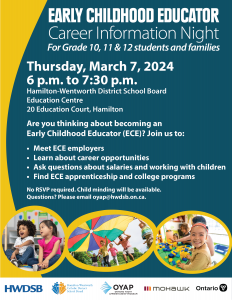
Early Childhood Educator Career Information Night – March 7
Early Childhood Educators (ECEs) plan, organize and implement activities to help develop children’s intellectual, physical and emotional growth and ensure their security and well-being. ECEs work on call in short-term and long-term assignments at multiple schools throughout the diverse communities of HWDSB including Hamilton Mountain, Hamilton Downtown, Waterdown, Flamborough, Dundas, Ancaster, Mount Hope, Binbrook, Stoney Creek and Winona.
multiple schools throughout the diverse communities of HWDSB including Hamilton Mountain, Hamilton Downtown, Waterdown, Flamborough, Dundas, Ancaster, Mount Hope, Binbrook, Stoney Creek and Winona.
Are you interested in becoming an ECE? Join us at ECE Career Information Night at the Education Centre (20 Education Court) on Thursday, March 7 from 6-7:30 p.m. to learn more about the role. The Information Night is open to all Grade 10, 11 and 12 students and families. Child minding will be available.
Attendees will have the opportunity to:
- Meet ECE employers
- Learn about career opportunities
- Ask questions about salaries and working with children
- Find ECE apprenticeship and college programs
No RSVP required. If you have any questions, please email [email protected].
Early Childhood Educator Duties
- Observe, monitor and assess the progress and development of children
- Provide numerous and varied opportunities for children to develop and refine their learning strategies, attitudes, skills, and knowledge
- Engage children in critical reflection and inquiry, in testing theories, and in discussing and questioning approaches in a play-based program
- Use a variety of instructional, assessment, and evaluation strategies to meet the needs of individual children, and to plan for next steps
- Engage in both formal and informal collaborative inquiry
- Create a learning environment that promotes the development of collaborative skills and critical and creative thinking skills, and support children to become thoughtful problem solvers and effective communicators
- Maintain a healthy physical, emotional, and social learning environment
- Support the transition of children to and from before and after-school programs
- Develop strategies to engage families in their children’s learning
Updated on Tuesday, February 20, 2024.

